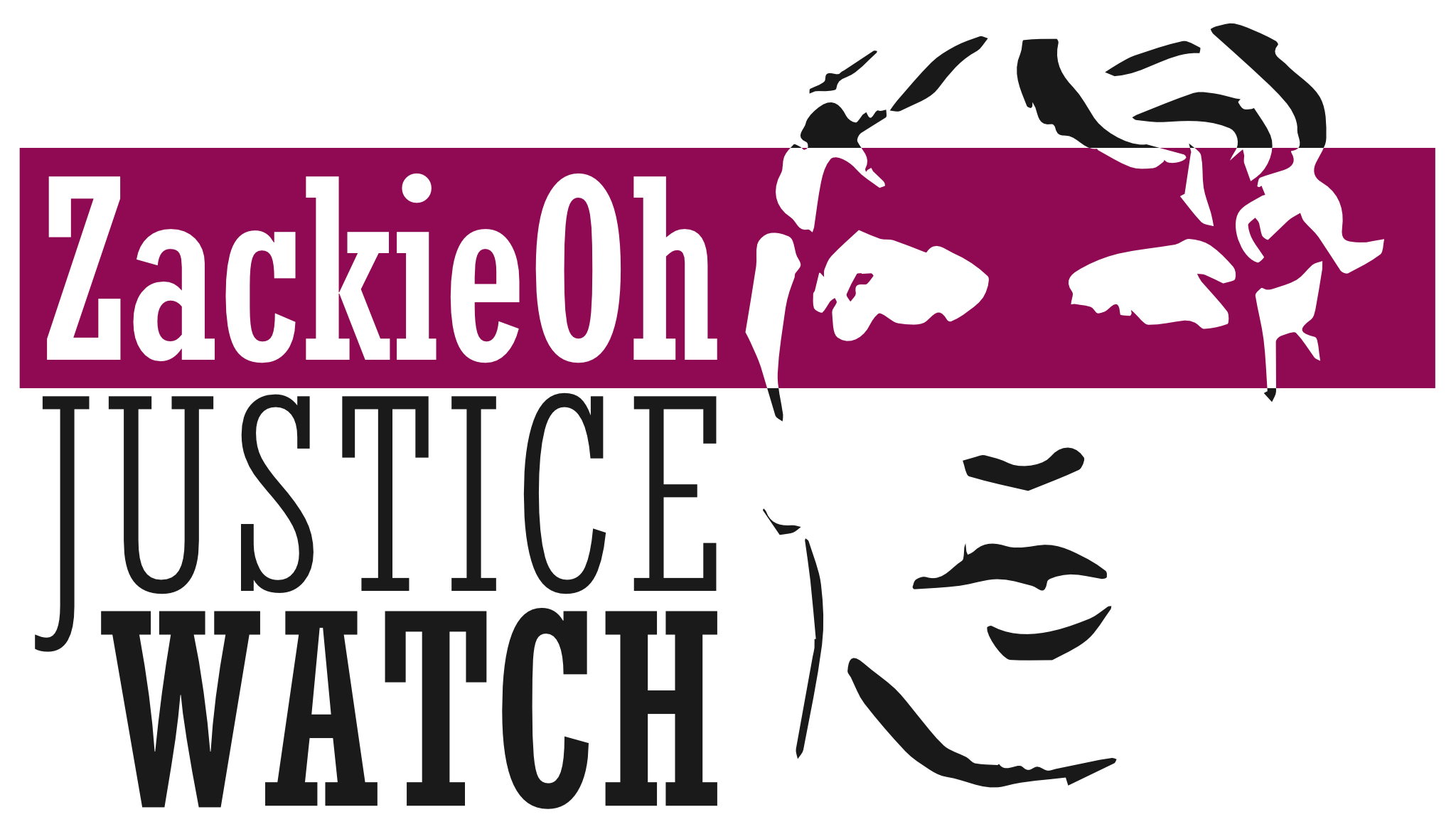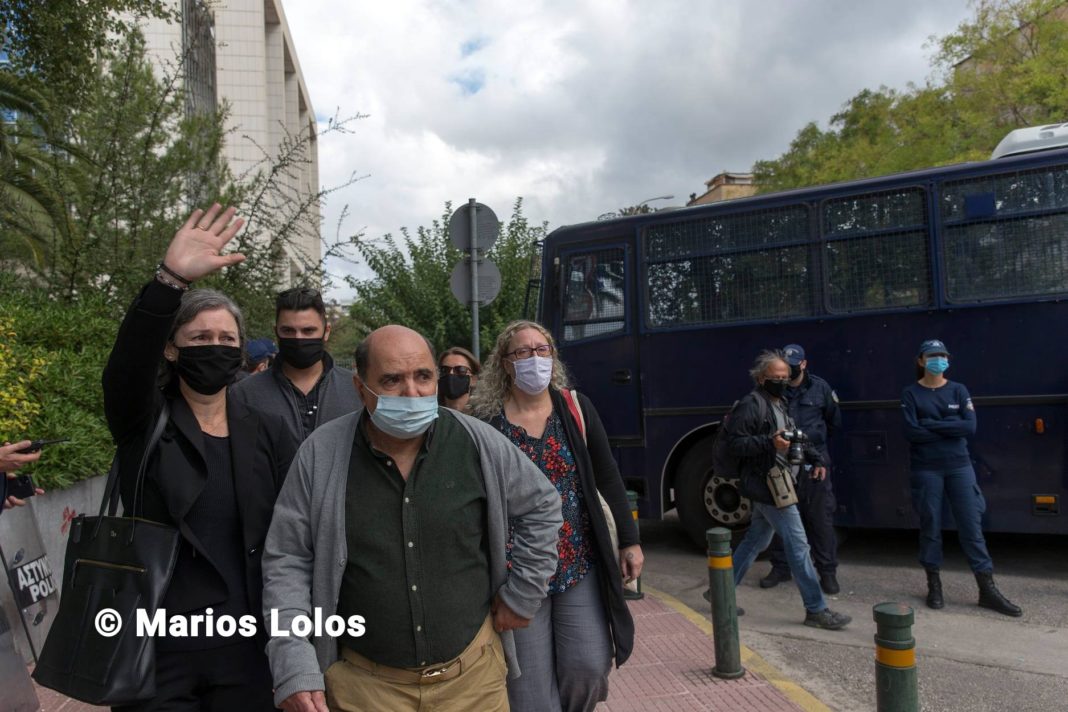Summary
| Date: | 21 October 2020 |
| Location: | Athens Court of First Instance, Degleri street, courtroom #2 |
| Access: | Access to the courthouse was limited due to measures against the spread of the Covid-19 pandemic. No audience was allowed in the courtroom with the exception of the victim’s family and one accompanying person per defendant (friend or relative), a few journalists and a representative of Amnesty International. |
| Defendants in attendance: | Athanasios Chortarias, owner of a real estate agency Vassilios Rousakos, police officer, Zeta Group Leonidas Alexandris, police officer, Zeta Group David Seferis, police officer, DIAS Group Ioannis Tsombanis, police officer, DIAS Group |
| Process: | Composition of the court, application for monitoring of the trial by members of civil rights groups, journalists and the Zackie Oh Justice Watch monitoring initiative, selection of the jurors, establishment of the list of defendants and witnesses. |
Report
The trial of the 6 defendants charged with causing deadly bodily harm to Zak Kostopoulos/Zackie Oh began today 21 October 2020 at the Athens Court of First Instance. The appointed prosecutor is Stefanos Baxevanis and the court is chaired by Georgios Kasimis with co-chairs Maria Dagonikou and Maria Skolariki.
All defendants were present with the exception of the owner of the jewellery shop Spyridon Dimopoulos.
Those present were: policemen Vassilios Rousakos and Leonidas Alexandris (Zeta Group), David Seferis and Ioannis Tsombanis (DIAS Group) as well as realtor Athanasios Chortarias.
Upon hearing from lawyer for the prosecution Clio Papantoleon that the prosecution would be bringing forth 11 witnesses, the lawyer for the policemen Athanasios (Thanos) Plevris interrupted to say: “Therefore we will be bringing forth 11 witnesses for each policeman. Because as I see it the witnesses brought forth by the prosecution are irrelevant to the case.”
The session began with a request by the lawyers for the prosecution to allow the presence of journalists, observers and members of civil rights groups in the courtroom. The court approved this request for some journalists. However, due to restrictions related to the Covid-19 pandemic, the court allowed access only to the victim’s family, one accompanying person for each of the defendants, and the representatives of some civil rights groups.
The court went into recess in order to seek a different room, following which, Thanos Plevris submitted a request to set dates for the first 3 or 4 days of the trial on the grounds that he should accommodate his duties as a member of parliament. The chair agreed to continue the trial on 6 and 11 November on the condition that there would be no requests for deferral. The next day of the trial is planned to take place on 6 November in courtroom 1.
The issue of the number of audience members allowed in the courtroom in the future, which is of paramount importance, became the subject of an intense discussion. The chair referred to the number of people allowed in the room on the basis of the government’s Covid-19 guidance, which stipulates that there should be at least 1.5 meters between individuals. He proposed that access be allowed for the victim’s family, 1 accompanying person per defendant, 5 journalists and 2 or 3 more people which may be representatives of monitoring groups, as had been agreed between the court and the prosecution.
In an answer to the representative of Amnesty International that was present in the room regarding the organisation’s request to have permanent access, the chair answered: “Please come and we will discuss it and take decisions in due time. The last paragraph of article 329 of the Code of Penal Procedure stipulates that parents and first-degree relatives have a right to be present. We’ll discuss the issue of monitors then and there.” The defendant’s lawyer Th. Plevris position was that the presence of institutional monitors is an insult to the court.
Lawyers for the prosecution Anny Paparrousou and Clio Panantoleon emphasised that, due to restrictions related to the spread of the Covid-19 pandemic, adequate measures should be taken to ensure the trial’s public character for those who cannot be granted access to the courtroom. They thus argued that the court must include monitors in the audience and that monitors should be informed of the possibility that they attend the trial. They gave the example of the monitoring initiative set up for the trial of Golden Dawn, where monitors followed the trial during more than 5 years without intervening and ensured that the trial was well-publicized despite the small number of journalists who covered the case. As they said: “Given that the court’s sessions will take place with restrictions, it is essential, in order to ensure the public character of this trial, that representatives of civil rights groups and the monitoring initiative be present in the room.”
Speaking to the selected jurors, the chair emphasised the importance of the trial, stating: “You have been selected for a historical trial.” The defense lawyer for the policemen, Thanos Plevris, shouted at this point: “No, this is not a historical trial. This is the discourse of the media and of those who are outside the court [referring to LGBTQI+ and antifascist groups rallying in the street].” To this the chair answered: “Fine, we could write a book at some point about what makes a trial historical.”
Upon reading the names of the witnesses, it was noteworthy to see the absence of the key person. This is the man “with the yellow T-shirt” who can be seen in published video material as one of the last people who spoke with Zak Kostopoulos when he prevented him from entering the Venetis bakery and who remained present throughout the lynching and arrest.
The court went into recess until 6 November following a request by Orfeas Filos, lawyer of defendant Athanasios Chortarias, arguing that his client should be self-isolating despite the fact that his Covid-19 test came up negative. It should be noted that, throughout the session, the said defendant stood next to the victim’s family, both inside and outside the courtroom.
Outside the courthouse, there was a rally of tens of LGBTQI+ and antifascist groups, as well as simple citizens. The day’s session began with a large deployment of police forces at each end of Degleri street, preventing access to the courthouse.
The trial will resume on 6 November 2020 at 9 a.m. in courtroom 1 of the Athens Court of First Instance.

